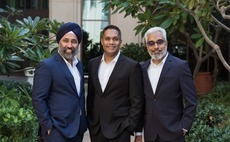
Profile: Intel Capital's Richard Hsu
Richard Hsu, managing director at Intel Capital, has spent 14 years as a VC investor, mostly in China. For all the change he has witnessed in entrepreneurs and ideas, some market features remain steadfastly the same
Rewind to the late 1990s, before the headlong dive into energy trading that spiraled into large-scale bankruptcy, and Enron was making another typically aggressive play, this time for power projects in China. Two plants were built in Chengdu and Hainan (only the first actually fired up), the culmination of a lengthy process that began with teams deployed to comb the country for potential deals.
This was how Richard Hsu cut his teeth in China, where he is now responsible for investments made by Intel Capital. Still on a business school placement program, he helped negotiate with local governments over support for potential projects, with grid operators over power purchase agreements, and with banks over financing.
"It was a great experience for an MBA student. My classmates were in New York working on spreadsheets until 4 a.m. I was running around talking to people, getting on-the-ground experience," Hsu says. "It was pretty random doing business in China back then."
The country retains a degree of randomness - or a string of idiosyncrasies - that crops up in a venture capital context.
Not least is the sense that it is possible to "show up with no experience and anything can happen," although the drawback is the absence of tried and tested processes. This is part a function of the low cost of putting an idea into production and part the innate willingness of Chinese entrepreneurs to pursue multiple ideas simultaneously and persevere with the one that gains the most traction with customers.
"This means there is a lot more trial and error here; it may not be the most efficient way of doing things but it means they happen fast," Hsu observes. "It also means that starting something in China is quite easy but scaling it is much harder. There is still a shortage of people with the right experiences."
Speed of the essence
Enron sent Hsu to China because of his Taiwanese heritage and fluency in Mandarin. He was born in Taiwan and moved to the US aged six. After training as an accountant with Deloitte & Touche in San Francisco - "it is the least glamorous job out there but a very good foundation to do a lot of different things and at 22 years of age you want options" - he spent nine months working in Taipei for a local securities house.
Business school at the University of Chicago followed and then Enron. Hsu departed for Intel Capital in 2000 when Enron abandoned the asset development side of the business in which he was most interested and made its ill-fated move into pure energy trading.
He recalls an exciting and aggressive corporate culture that backed smart individuals with money-making ideas. The flip side, as has been proven numerous times in corporate America, is that it only takes a handful of these individuals pushing legal and moral boundaries to reduce a hastily-constructed house to ruins.
Interestingly, the description of Enron executives living on the edge bears some similarities to the qualities Hsu seeks in a Chinese entrepreneur: "You don't want a guy who shoots too straight but you also don't want a guy who is too fast and loose. There has to be a desire to test the rules, but do it in the right kind of way."
This is not an endorsement of illegal or immoral behavior but an appreciation of the need for fleetness of thought and pragmatism in a rapidly-evolving technology market. While an inability to scale a business is a very real problem for entrepreneurs in China, just as many go wrong when they fail to spot or respond to changes in demand or product requirements.
The example Hsu gives is Miartech, a manufacturer of communication chipsets that enable smart meters to relay information on energy usage. When Intel Capital participated in a Series B round of funding in late 2011, Miartech's business model was predicated on China's State Grid Corp. rolling out smart meter initiatives. However, 12 months on smart meter deployment was slowing and the company was forced to find another way of commercializing its technology.
Miartech is now in the process of opening up a new business line providing bespoke energy efficiency monitoring solutions for the home and office. Property developers, which receive subsidies for putting up buildings that meet energy-saving targets, are the primary customers.
"Good entrepreneurs can read the market situation and say, ‘I need to change.' You have to adapt to that change and support your entrepreneurs, and it is happening faster and faster," Hsu notes.
Ecosystem evangelism
Although Intel Capital is stage agnostic, it typically invests in Series B and C rounds, by which point companies usually have a product that can take advantage of value-added programs offered by Intel Capital. Investees either have an actual or potential agreement with a business unit of parent company Intel Corporation, or they fall in with an industry trend the firm wants to keep an eye on.
This doesn't necessarily nvolve making investments in semiconductors only. Rather Intel Capital targets companies operating in ecosystems that, if nurtured, will likely spur demand for semiconductors across Intel's core areas: servers (cloud computing, data centers and big data), terminals (PCs, handsets and tablets) and embedded systems (consumer and enterprise applications that generate data). Software and related services account for roughly 70% of deal flow.
In excess of $670 million has been invested in more than 110 Chinese companies since 1998 but targets are continually moving. "The entrepreneurs of five years ago are not the entrepreneurs of today - they are converging in terms of their outlook on the world," Hsu adds. "If anything, the Chinese VC industry has developed at a much quicker pace than the US industry."
Latest News
Asian GPs slow implementation of ESG policies - survey
Asia-based private equity firms are assigning more dedicated resources to environment, social, and governance (ESG) programmes, but policy changes have slowed in the past 12 months, in part due to concerns raised internally and by LPs, according to a...
Singapore fintech start-up LXA gets $10m seed round
New Enterprise Associates (NEA) has led a USD 10m seed round for Singapore’s LXA, a financial technology start-up launched by a former Asia senior executive at The Blackstone Group.
India's InCred announces $60m round, claims unicorn status
Indian non-bank lender InCred Financial Services said it has received INR 5bn (USD 60m) at a valuation of at least USD 1bn from unnamed investors including “a global private equity fund.”
Insight leads $50m round for Australia's Roller
Insight Partners has led a USD 50m round for Australia’s Roller, a venue management software provider specializing in family fun parks.






